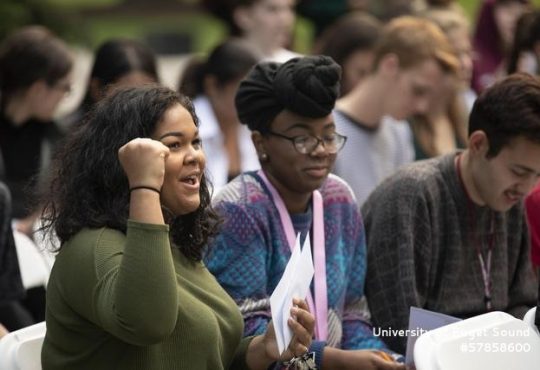A Public Letter to the faculty and administration of the University of Puget Sound,
I am writing this letter out of concern. Lately, there has been a lot of talk about increasing the diversity on this campus, but to be honest, I hope that the University of Puget Sound does not see an increase in its enrollment of students of color anywhere in the near future. This is due to the fact that I don’t believe that this campus is fully prepared to support a truly diversified student body.
Before I expand on my concern, it is important to situate myself. I am undocumented. My parents brought me to this country when I was three years old, a decision they made out of pure necessity. They left behind their friends and family, a majority of whom they haven’t seen since. It wasn’t until I was 13 that I started to realize what it meant to be undocumented in this country; how my “illegal” status would affect me, my opportunities and my future. I learned that I wouldn’t be able to get a license; board a plane, travel outside of the U.S. or hold the kind of job I wanted to. I couldn’t do many of the things that my friends did. I was always having to lie when my friends asked why I wasn’t having the same experiences they were. Rather than explaining to them that I couldn’t, I would pretend that I didn’t want those experiences- pretending made things easier for them. I couldn’t explain to people that I was undocumented due to fear of my own deportation or the deportation of my parents.
When the executive order of Deferred Action for Childhood Arrivals was signed, some of the realities changed. I can drive and travel within the country. I have a social security number, but I still can’t leave the country unless I want to exile myself for the next 10 years. When I got my letter granting me this new status two years ago, my housemates, rather than celebrating with me, became annoyed at all the noise I was making.
Thus, alienation is not a new sentiment in my life, but I have managed. I’ve learned to create a sense of community for myself. Never, however, have I felt as isolated as I have during my time at Puget Sound. This alienation arises from the following:
The university lacks a support system for students of color. This is lacking both within the student body, but most importantly it is lacking within the faculty. It is hard to develop the same kinds of relationships that my classmates have with their professors when they don’t understand my experience or worse when I don’t feel like I can share my experience with them and/or when I do share with faculty and I am misunderstood altogether by those I hope will be supportive. It is exhausting to have to explain why I didn’t go on study abroad or why I am not applying to international programs. Our professors can be excellent mentors and resources, but how can they mentor students whose experiences they don’t understand and don’t show interest in understanding? We need to acknowledge the fact that if we want a diverse student body then we need to be willing to provide students with an understanding faculty that can truly support and guide them.
When the subject of privilege and race are brought up in the classroom, it is obvious that people become uncomfortable. Rather than unpacking this discomfort, the discussion will end. When something that I find offensive is said in class, I find myself keeping silent. This silence is not due to my lack of outrage or wanting to speak up. Rather, my silence is a product of my exhaustion and fear. After attempts to talk about whiteness, race, racism as imbricated power structures, there comes the inevitable comment of “not all white people are like that” or worse yet, the eye-rolling. Rather than taking a moment and being introspective about how our privileges may benefit us, we jump on the defensive and no intervention occurs.
I’ve spoken to some professors about how a term like “illegal alien” is dehumanizing. They have implied that I should be the one to speak out in class when the term is used. Furthermore, they have implied that it is my responsibility to call out any other microaggression. Why? To “not silence me or take away my agency.” What they fail to understand – beside the fact that the use of these terms are OUR problem and not just my own – is that on this campus, I’ve never felt safe speaking up. Speaking up results in feeling alienated. As a product of faculty not being willing to advocate on behalf of students during these moments, the burden then falls onto the student. And let me tell you, the burden is enormous.
There is resistance to conversations of race/ethnicity, privilege and power. Often times, we do not engage on these topics due to the discomfort of the majority. In doing so, we are silencing the already isolated and alienated voices on campus. Yes, there are members of our campus community who are willing to engage, but it’s not enough. The proposed diversity curriculum is a small step in the right direction, but if we want to create an environment in which students of color feel supported, we need to bring diversity to the faculty.
I am leaving UPS angry and disappointed. As things stand now, I will not recommend this university to other undocumented students or students of color. What I have written here is only my own experience but certain aspects of my letter have resonated and continue to resonate with other students. Beyond that, I write this letter in an attempt to bring about change. UPS has enormous potential and I would love to see us all live up to it.
Thank you for your time,
Mariana Molina



